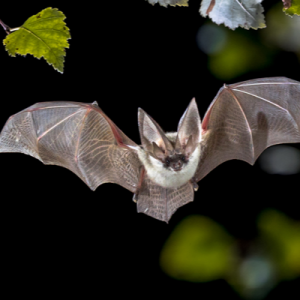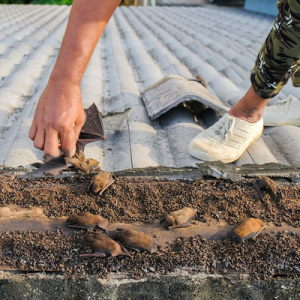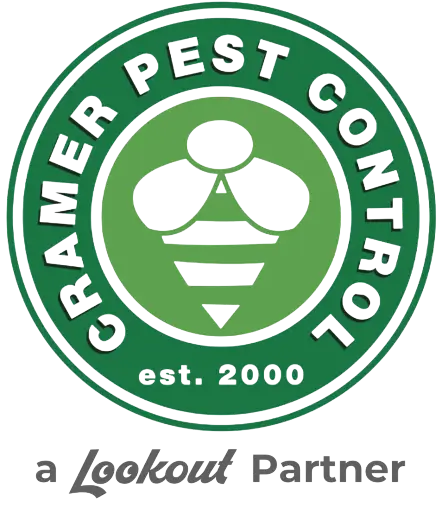Though not as common as the insects that invade our homes, bats are one of the pests we see at Cramer Pest Control. These rodents can pose health risks for your family and damage the structural integrity of your home. If you have seen even one bat indoors, do not hesitate to call in a bat animal control technician.
Dealing with the occasional summer ant or other bugs is one thing, but bats are a horse of a different color. A whole new can of worms. They pose many problems for us and our property.
Bats Are Moving In
In nature, bats live just about anywhere from forests to deserts. But as humanity continues to encroach on their natural environment, bats are becoming frequent visitors to suburban and urban areas. Bat homes, called “roosts,” are usually found in things like trees or caves. But as they are forced to seek shelter in manufactured areas, they will look for attics to roost in.
Bats Damage Property
Bats themselves won’t damage your property, but their droppings, known as guano, can. They are not like termites in that they don’t destroy your property for food or build a shelter. That being said, bat guano can leave stains on ceilings, walls, and floors. It can also damage insulation. Most serious of all, if bats get access to the right part of your home, their guano can find its way into your water supply. As the guano builds up, so does the accumulation of bacteria. Even after the animals have been removed, the smell may linger and is extremely hard to remove.
In a worst-case scenario, the bat(s) could die in your attic, walls, etc., and create an unbearable stench. That’s why it’s best to contact Cramer for bat control before the issue becomes dire.
Bats Spread Disease
Bats can spread a variety of diseases through their guano.
Histoplasmosis
Bat guano is full of the fungus Histoplasma capsulatum. If the bat guano dries up, becomes air born, and is inhaled, it will give you a lung infection called histoplasmosis. This is similar to the diseases carried by rodent droppings. You have heard that you shouldn’t vacuum up rodent droppings, and this is why. Histoplasmosis can spread beyond the lungs and infect the entire body. In that circumstance, it can be fatal. Symptoms may include:
- Fever
- Cough
- Fatigue
- Chills
- Headache
- Chest pain
- Body aches
Because these symptoms mirror other common ailments, it can be difficult to diagnose histoplasmosis, which allows the fungus to worsen in your system. Further, the presence of this fungus can mimic the look of lung cancer on CT scans or chest x-rays, which of course, will cause you a great deal of stress if you believe you’ve got lung cancer. That’s why it’s so important that you call in the help of bat pest control services and do not attempt to clean up the guano yourself.
Rabies
Next to raccoons, bats are the second-largest rabies exposure threat to humans and pets. The virus is transmitted through the bite of an infected bat. However, you can also be exposed to rabies through contact with bat fur, guano, blood, or urine. While bat bites in humans are exceedingly rare, it’s really not worth the risk of handling the bats yourself or trying to clean up after them. Early signs of rabies may mimic the flu, but the patient will also experience a prickling or itching sensation at the site of the bite. This will rapidly progress to acute symptoms of cerebral dysfunction, anxiety, confusion, and agitation, including delirium, abnormal behavior, hallucinations, hydrophobia (fear of water), and insomnia. Unfortunately, once clinical signs of rabies appear, the disease is nearly always fatal.
How to Tell You Have Bats in Your Home
Because bats are quiet compared to other common house pets and being nocturnal in nature, you may not realize you have an issue at first. Here are some things to look for:
Droppings
Bats use the same entry and exit points to access your home, typically located around your roofline, as they almost always reside in your attic. They will often relieve themselves as they squeeze through the opening into your attic. Examine the exterior walls of your home, as well as the ground, and look for bat guano.
Entry Points
Bats will always use the same entry point(s) to access your attic, crawl space, etc., and these will likely be near the roofline or above it. A common thing we see is wall vents in the siding of homes. You should be able to see the access point from outside your home upon inspection. Bats are not clean animals. In addition to guano, they’ll leave behind a greasy film and create a very stained-looking area near the access point.
Sight And Sound
If you hear an unusual noise at night, like scratching or squeaking, it could be bats. They are typically quieter than other pests but not perfectly silent. If you believe you’ve located the access point, stake it out at night and see if you can catch bats coming or going.
Why Call Bat Control
We’ve already discussed the horrifying diseases bats carry, but their damage is more than medical. At Cramer, we will humanely remove the bat or bats without harming them. Next, we’ll safely clean up their droppings, so there are no lingering stains or stench and sanitize the area. Lastly, we’ll ensure the access points are sealed off so you don’t have bats make a return visit.
Get Bat Pest Control Near Charlotte
If you’ve got a bat in your attic, basement, or garage, don’t hesitate to call in the professionals. Cramer Pest Control‘s indoor pest control program has bat control specialists that will remove the bat from your property without harming the animal. If you’ve got a bat problem, give us a call at (704) 763-0204 for service in North Carolina, or for service in South Carolina, call (803) 802-7540 and speak to an expert. You can also leave us a message online here.
You can also leave us a message online here. And don’t forget to check out the blog page and like us on Facebook to stay up to date on service offerings and special deals!
Bats In The Attic in North Carolina and South Carolina Don’t Wait To Call Pest Control?
Protecting North Carolina and South Carolina
